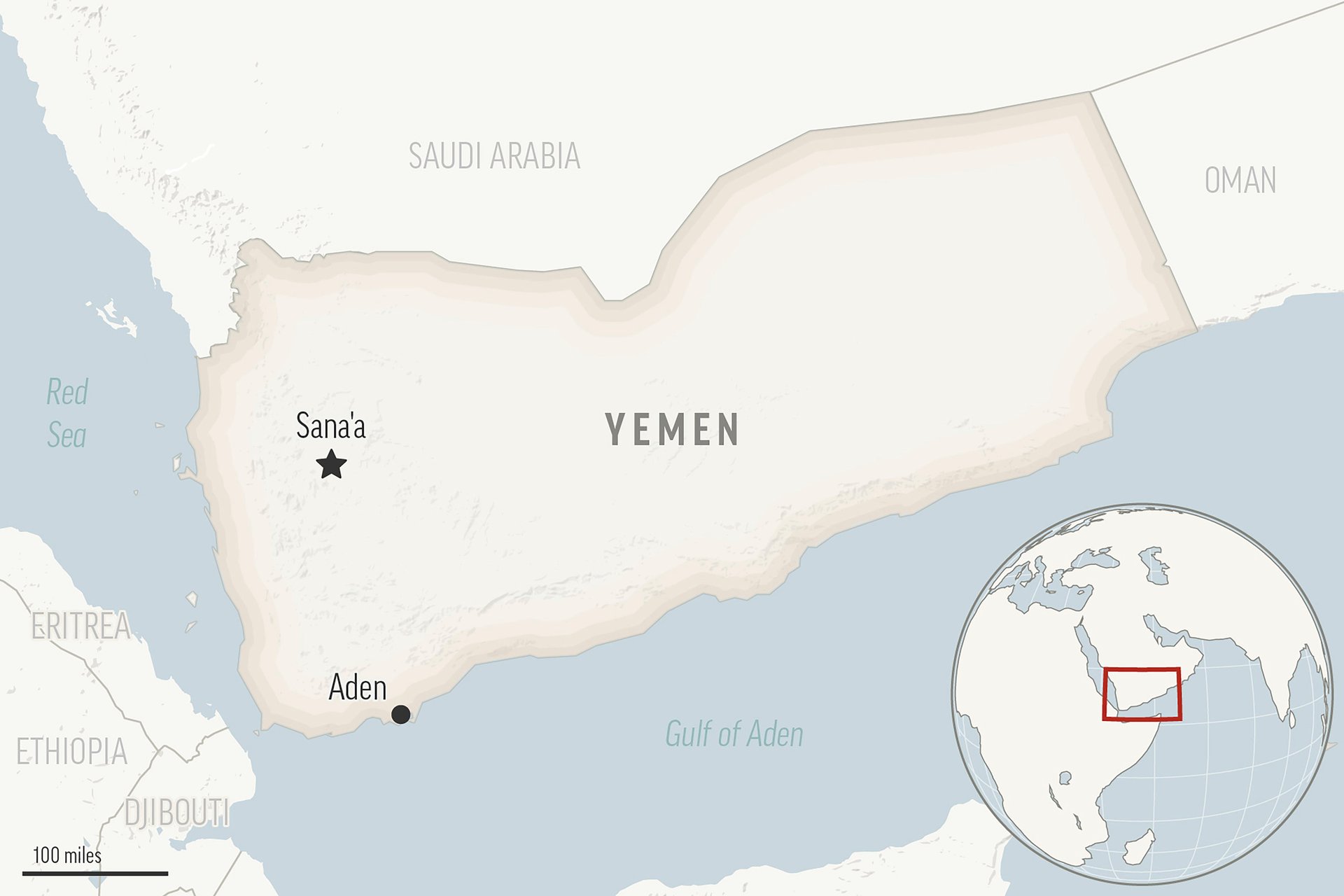Missile fired from rebel-controlled Yemen misses a container ship in Bab el-Mandeb Strait
The U.S. military says a missile fired from territory controlled by Yemen’s Houthi rebels missed a container ship traveling through the crucial Bab el-Mandeb Strait

DUBAI, United Arab Emirates (AP) — Yemen's Houthi rebels fired a ballistic missile Thursday that missed a container ship traveling through the crucial Bab el-Mandeb Strait, the U.S. military said, the latest attack threatening shipping in the crucial maritime chokepoint.
Suggested Reading
The seaborne assaults by the Iran-backed Houthis have been part of their pressure campaign over the Israel-Hamas war raging in the Gaza Strip.
Related Content
The Houthis have attacked vessels in the Red Sea and launched drones and missiles targeting Israel. In recent days, they have threatened to attack any vessel they believe is either going to or coming from Israel, though several vessels targeted had no apparent link.
The missile fired Thursday splashed harmlessly in the water near the Maersk Gibraltar, a Hong Kong-flagged container ship that had been traveling from Salalah, Oman, to Jeddah, Saudi Arabia, the U.S. military's Central Command said.
The “Maersk Gibraltar was hailed (on the radio) by the Houthis, who threatened further missile attacks,” Central Command said. "While this incident did not involve U.S. forces, we continue to closely monitor the situation. These attacks continue to threaten international maritime security.”
The British military's United Kingdom Maritime Trade Operations, which monitors Mideast shipping lanes, put out an alert warning of an incident in the strait, which separates East Africa from the Arabian Peninsula.
Later Thursday, a Houthi military spokesman claimed without offering evidence that the rebels had hit the Maersk Gibraltar with a drone strike after its crew failed to respond to the rebels' call to surrender. The spokesman for the Iran-backed fighters, Brig. Gen. Yahya Saree, also alleged the vessel had been heading to Israel — again without providing evidence to support the claim.
Maersk, one of the world’s biggest shippers, issued a statement reporting the attack.
“The crew and vessel are reported safe,” Maersk said. “The safety of our crew and vessel is our top priority and all possible security measures are being taken to ensure we remove them from harm’s way.”
The company added: “The recent attacks on commercial vessels in the Bab el-Mandab Strait are extremely concerning. The current situation puts seafarer lives at risk and is unsustainable for global trade. As it cannot be solved by the global shipping industry on its own, we call on political action to ensure a swift de-escalation.”
Earlier in the day, the private intelligence firm Ambrey said the ship had also been called over the radio by “an entity claiming to be the ‘Yemeni Navy’ ahead of the missile being launched towards the vessel."
“The ‘Yemeni Navy’ demanded the vessel alter course to head for Yemen," Ambrey said and assessed the entity to be the Houthis.
On Wednesday, two missiles fired from Houthi-held territory missed a commercial tanker loaded with Indian-manufactured jet fuel near the key Bab el-Mandeb Strait. Also near the strait, a missile fired by Houthis on Monday night slammed into a Norwegian-flagged tanker in the Red Sea.
Global shipping has increasingly been targeted as the Israel-Hamas war threatens to become a wider regional conflict — even during a brief pause in fighting during which Hamas exchanged hostages for Palestinian prisoners held by Israel. The collapse of the truce and the resumption of a punishing Israeli ground offensive and airstrikes on Gaza have raised the risk of more sea attacks.
The Bab el-Mandeb Strait is only 29 kilometers (18 miles) wide at its narrowest point, limiting traffic to two channels for inbound and outbound shipments, according to the U.S. Energy Information Administration. Nearly 10% of all oil traded at sea passes through it. An estimated $1 trillion in goods pass through the strait annually.
In November, Houthis seized a vehicle transport ship linked to Israel in the Red Sea off Yemen. The rebels still hold the vessel near the port city of Hodeida. Separately, a container ship owned by an Israeli billionaire came under attack by a suspected Iranian drone in the Indian Ocean.
A separate, tentative cease-fire between the Houthis and a Saudi-led coalition fighting on behalf of Yemen’s exiled government has held for months despite that country’s long war. That’s raised concerns that any wider conflict in the sea — or a potential reprisal strike from Western forces — could reignite those tensions in the Arab world’s poorest nation.
Also Thursday, unknown attackers boarded the Malta-flagged bulk carrier Ruen, managed by Navigation Maritime Bulgare, in the Arabian Sea off the Yemeni island of Socotra, Ambrey and the UKMTO said. Bulgarian media acknowledged the ship's seizure and said the ship's 18-member crew hailed from Angola, Bulgaria and Myanmar. No group immediately claimed responsibility for the assault.
___
Associated Press writers Jack Jeffery in Cairo and Jan M. Olsen in Copenhagen, Denmark, contributed to this report.